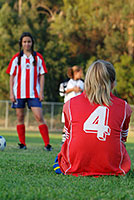Keeping our Kids Healthy this School Year
 Moms like to plan ahead for all of the experiences our children and teens will face during the school year. One of those experiences is contact with germs. Since kids are hands-on at school—whether it’s younger children handling toys and books in the classroom or on the playground at recess, or teens in contact during extracurricular sports or by sharing lip gloss—it’s safe to anticipate that germs are in their future. If you consider that some of those germs can be life threatening, it’s even more important to plan ahead.
Moms like to plan ahead for all of the experiences our children and teens will face during the school year. One of those experiences is contact with germs. Since kids are hands-on at school—whether it’s younger children handling toys and books in the classroom or on the playground at recess, or teens in contact during extracurricular sports or by sharing lip gloss—it’s safe to anticipate that germs are in their future. If you consider that some of those germs can be life threatening, it’s even more important to plan ahead.While meningococcal meningitis isn’t something that’s talked about very often, it’s actually a very real and potentially devastating disease. Invasive meningococcal disease (IMD), which includes meningococcal meningitis, is an aggressive and often fatal disease that strikes about 200 Canadians—mostly healthy children and adolescents—each year. Sadly, 1 out of 10 people infected with IMD will die. Of those who survive, some (11 to 19 per cent) will be permanently disabled.
Facts and tips to ensure your family is protected
 Fact: Meningococcal meningitis is contagious, and can be spread through close contact involving secretions from the nose or throat, such as sharing drinks, water bottles or eating utensils, or by kissing.
Fact: Meningococcal meningitis is contagious, and can be spread through close contact involving secretions from the nose or throat, such as sharing drinks, water bottles or eating utensils, or by kissing.
Tip: Make sure that your children know not to share these items with others. Discourage sharing by packing your child’s own cutlery in their lunch, and send them with their own labelled water bottle to extracurricular sports.
Fact: The early symptoms of meningococcal meningitis are often similar to those of the flu. Meningococcal meningitis can progress very rapidly and cause death in 24 to 48 hours.
Tip: Be aware of the warning signs and symptoms and speak to your family doctor about vaccination against the four vaccine-preventable strains of meningococcal meningitis.
Recognize the Warning Signs
Parents should seek medical attention immediately if babies or toddlers demonstrate any of these symptoms:
- High fever
- Fretfulness, irritability—particularly when handled
- Difficulty awakening, drowsiness
- Difficulty feeding
- Vomiting
- Stiff neck, bulging fontanelle (soft spot on top of head) may occur but not at the outset
Also, parents should seek medical attention immediately if children or adolescents have some or all of these symptoms:
- Sudden high fever
- Drowsiness or confusion
- Severe, unrelenting headache
- Stiff neck
- Intolerance to bright light and sounds
- Nausea and/or vomiting
- Twitching, convulsions, delirium particularly in children
- A rash of small, irregular purple or red spots all over the body may indicate meningococcal meningitis
 Is My Child Protected?
Is My Child Protected?
If your child received the meningococcal conjugate C vaccine as an infant or at one year of age, they are still unprotected against the other three vaccine-preventable strains until they receive the Menactra® vaccine. Menactra® protects against strains A, C, Y and W-135.
Menactra® vaccine has over 5 years of real world experience and over 30 million doses distributed worldwide.
Experts Recommend the Vaccine: MENACTRA®
The Canadian Paediatric Society (CPS) issued a position statement in 2009 which recommends a meningococcal C conjugate vaccine dose in infancy, a dose of Menactra® from age 2 years for children at increased risk for meningococcal infection, and a booster dose in early adolescence—around 12 years of age.
The CPS also states physicians can offer Menactra® for children over two years of age previously immunized against strain C to reduce the risk of strains A, Y and W-135.
Menactra® Vaccine School-Based Programs
Menactra® is available in school based programs in Prince Edward Island, New Brunswick, Newfoundland and Labrador, Northwest Territories and Ontario. The Ontario government added Menactra® to its routine immunization program for grade 7 students in 2009. It’s important to note that parents of younger children or teens who missed the program can get Menactra® for a cost at their physicians’ office. Check with your insurance provider to see if your vaccination is covered.
 So, has your child or teen been vaccinated with Menactra® yet?
So, has your child or teen been vaccinated with Menactra® yet?
Menactra® is a vaccine to prevent meningococcal meningitis and other meningococcal disease caused by strains A, C, Y and W-135 of the bacteria called Neisseria meningitidis, in persons 2 to 55 years old. It does not protect against disease caused by strain B, and is not a treatment for meningococcal infections or their complications. The length of protection is currently not known. As with any vaccine, Menactra® may not protect 100% of vaccinated individuals. Menactra® should not be used in persons with known severe allergy to any of its components or its container, or who have been diagnosed with Guillain Barré syndrome. Some persons may experience allergic reactions and side effects, which are usually mild and go away within a few days, such as pain, redness or swelling at the injection site, headache, fatigue or drowsiness.
Talk to your doctor to see if Menactra® is right for you or your child.
Learn More
- Visit the Meningitis Research Foundation of Canada website at www.meningitis.ca
- Check out www.menactra.ca for information on the vaccine, including a copy of the Consumer Information leaflet
- Follow Twitter.com/MeningitisAware for meningitis prevention tips and related information













